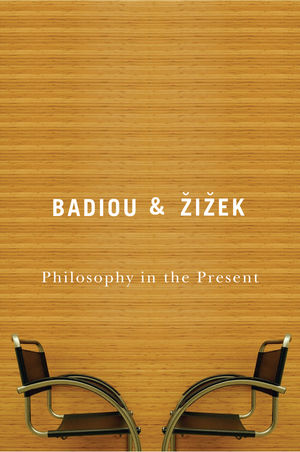 Philosophy in the Present (Polity, 2009) is a recent translation of talks given by Badiou and Zizek in Vienna in 2004 and published in German in 2005 as Philosophie und Aktualität. Ein Streitgespräch.
Philosophy in the Present (Polity, 2009) is a recent translation of talks given by Badiou and Zizek in Vienna in 2004 and published in German in 2005 as Philosophie und Aktualität. Ein Streitgespräch.I'm not going to give a review of either Badiou's or Zizek's contributions, because much of what they say has been taken up by them in other works. Badiou offers some initial comments about the conditions of philosophy (if you haven't heard, they are politics, art, mathematics and love), and then he reproduces his "Eight Theses on the Universal," published previously in Theoretical Writings (edited by Ray Brassier and Alberto Toscano, Continuum, 2004).
Zizek's essay largely re-affirms Badiou's stance in general, and presents his argumentation for why we should reject the concept of totalitarianism: that it presents a false equivalence between the egalitarian project of communism and fascism. In addition, the concept of totalitarianism, for Zizek, blocks a more "appropriate socio-politicial theory with which we can analyse these of course deplorable phenomena like Nazism and Stalinism in their own conceptuality as projects" (57). Basically themes that have been treated more extensively in his other work (like, I suppose, Did Somebody Say Totalitarianism?).
The discussion between the two is more entertaining than it is a contentious debate.
Despite the repetition, or because of this repetition is here more accessible, Philosophy in the Present is being touted as an introduction to Badiou and Zizek. However, I don't think it is very useful in this function, not just because the texts are unpolished, or that they don't introduce new material, but primarly due to Peter Engelmann's introduction. Keep in mind what I have said above, and read:
It was not after all very long ago that we talked about what the role of the philosopher Karl Marx had been in the totalitarian regime of Russia, and later the countries of the Soviet bloc. Wasn't the mass murderer Pol Pot an intellectual educated in Paris? How many people were humiliated, expelled and murdered during the Chinese Revolution? [...] the participation of intellectuals in the crimes of the twentieth century weighs heavily on the self-understanding of this social group, at least insofar as it maintains a practical memory of history (viii-ix).Now, is not the purpose of an introduction to introduce something of either Badiou or Zizek's theory of political commitment? Because this passage ignores, or is a deliberate evasion of, both of their extensive bodies of work, which reject the ideological frame that naively blames intellectuals for political purges or that assumes consensus around the meaning of the Chinese Revolution, not to mention the false equivalence of Marx, who did not live to see any communist state revolutions, with Pol Pot, other intellectuals, or obviously Mao. I find it bizarre, and disappointing, that two philosophers who are sharply critical about revisionism (like Badiou's unapologetic position about his Maoism) let a book be published that is prefaced by such revisionism.
A more honest, and more productive, procedure for the introduction isn't to critique intellectuals for their participation in leftist politics, but ask how intellectuals continue to participate in maintaining and affirming the status quo of liberal democracy. This question isn't too abstract, being that the French media created the nouveaux philosophes, and it actually functions to introduce something of what makes both Badiou and Zizek interesting, rather than recycle platitudes about leftist intellectuals.
Thus, for introductions, instead, I recommend Badiou's Ethics, and perhaps Zizek's most current title (but the clock is ticking...) First as Tragedy, then as Farce (our review is here), or, of course, The Sublime Object of Ideology.
No comments:
Post a Comment